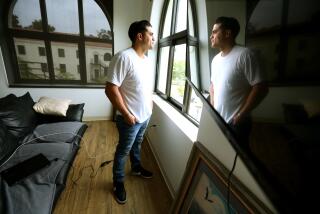Wayteing It Out : Draft Resister Finds Opportunities in His House Arrest
- Share via
David Wayte is learning about being a prisoner in his own home.
“Walking somebody out to the car after a visit, I automatically stop at the property line,” he said in an interview Friday. “It’s almost like an instinct now.
“I just don’t leave the property. In the back of my mind is the knowledge that I could now be in (federal) prison. And I’m relieved that I am not. . . .”
Wayte, 24, who lives with his wife, Jacqui, 23, in his grandmother’s home, has completed nearly two weeks of one of the most unusual sentences ever meted out in Los Angeles federal court--six months of house arrest.
Calling it the most difficult sentencing he had ever faced, U.S. District Judge Terry J. Hatter Jr. on Sept. 10 ordered Wayte not to leave the house, after he pleaded guilty earlier this year to failing to register for the Selective Service draft.
Wayte, who does not regret his opposition to the draft, entered the guilty plea after the U.S. Supreme Court upheld the government’s selective prosecution of only those young men who publicized their refusal to register. Wayte wrote a letter to then-President Jimmy Carter, announcing his intention not to register, after the draft was reinstituted in 1980.
Hatter said he had decided on probation and house arrest to prevent Wayte, a former philosophy student at Yale University, from doing community service work, which he did at a school for the developmentally disabled and at a soup kitchen and shelter for the homeless, both in Pasadena.
His attorneys had argued that extensive community service would be a proper punishment for Wayte.
“It was a very creative sentence,” Wayte said Friday. “It’s one that allows me opportunities that I would not have had the time to do otherwise . . . and (yet) it’s very restrictive.”
Instead of going to work each day, he is trying to settle into a daily routine in a middle-class, stucco home in Whittier.
“I miss my work with the developmentally disabled and at the soup kitchen . . . but my grandmother is delighted to have me (at home) full time,” he said.
Up at 6 a.m., Wayte said he meditates and writes letters and anti-war articles in the morning. Afternoons have been spent chatting with visitors, reading or just getting used to his situation. He also has given his wife a lengthy shopping list of books, food . . . (and) “everything I need on a day-to-day basis,” he said.
Whittier was founded by Quakers in 1881, and Wayte, who describes himself as an “attender” of Quaker services, admitted that the town was probably the last place he expected to serve his sentence.
“There’s not a great deal of (ethnic) diversity here . . . but the people are friendly, and I don’t feel extremely uncomfortable here,” he said.
Officials of the Quaker church that Wayte attends in Pasadena said services will be held every other Sunday at his home.
Federal probation officers in charge of Wayte have taken a low-key approach to the house arrest. There is no constant monitoring of his movements.
Weekly Visits
Probation officials said Wayte will be visited weekly and “unannounced phone calls will be made” to make sure that Wayte is complying with his sentence, one federal probation official said.
An active person, Wayte said his confinement in the coming months will test him.
“I can only hear lawn mowers, the swimming pool filter and the sounds of the house so long before they get to me,” he said. “It’s a test to remain calm (and) to have peace of mind.”
More to Read
Sign up for Essential California
The most important California stories and recommendations in your inbox every morning.
You may occasionally receive promotional content from the Los Angeles Times.










